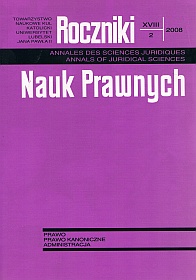The Office of Chancellor in a Diocesan Curia
Abstract
The article makes an attempt to present the institution of diocesan chancellor in the light of Code of Canon Law of 1983, documents of the Holy See, and the Canon doctrine.
According to the Code of Canon Law (1983), “the diocesan curia consists of those institutions and persons which assist the bishop in the governance of the whole diocese” (Can. 469). Of the bodies and offices which the curia must comprise, the office of chancellor is vital.
The first part, after a brief introduction, provides an outline of the historical development of the office of the diocesan chancellor. These considerations make it possible to assert that this office has long played a momentous role in the administration of the diocese.
The next part of the article explains the notion, qualifications, appointment and removal of the chancellor. The definition of chancellor was constructed on the basis of various regulations. It was found that the legislator attaches great importance to the attributes of the diocesan chancellor, who is required to have high ethical standards, theological and canonical knowledge, expertise in canon cases, as well as administrative practice.
The third part of the present article is devoted to tasks of the chancellor, such as taking care that the curia records are made, sent, and properly stored in the archives. The abovementioned official at the same time acts as the notary and secretary of the curia.
The final section of the article comprises conclusions which follow from an analysis of the regulations of the Code of Canon Law (1983), documents of the Holy See, and opinions of canonists.
Copyright (c) 2008 Roczniki Nauk Prawnych

This work is licensed under a Creative Commons Attribution-NonCommercial-NoDerivatives 4.0 International License.


